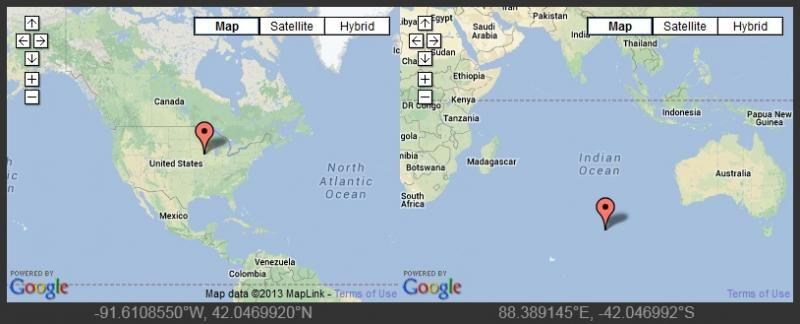If you dug the proverbial hole through the centre of the earth, where would you come out?
For me it is in the Bay of Biscay, near the border between France and Spain...
Not much fun for North Americans - pretty much the Indian Ocean for the lot of us.
Indian Ocean, 1275 miles from
The Indian Ocean about 1275 miles west of Peaceful Bay, Australia. That would be a very long swim to dry land.
> If you dug the proverbial hole through the centre of the earth, where would you come out?
Well, not China - another lie the adults told me. :pissed:
Like Jim, my antipode is in the Indian Ocean.

[sarcasm]Somewhere around here.[/sarcasm]
East to the Atlantic Ocean from my house puts me at the Charleston Harbor and/or the north end of Sullivan Island, South Carolina.
West to the Pacific puts me on Mission Beach in San Diego.
Removing the negative from my longitude puts me west of the Yangtze River near some abandondoned looking buildings marked Langrikou.
Adding a negative to my lattitude puts me in the Indian Ocean west of Perth Australia.
> Removing the negative from my longitude puts me west of the Yangtze River near some abandondoned looking buildings marked Langrikou.
Practically speaking, it won't make any difference. You'll still be somewhere in the middle of the Indian Ocean. But technically speaking, you can't calculate your antipodal point by just changing the sign of the longitude. You have to calculate the supplementary angle and change the sign.
In his book, The Making of the Earth (page 138), J. W. Gregory states that less than 4% of the land on earth is antipodal to land.
"The ends of any straight line passing through the centre of the earth and reaching the surface are the antipodes of one another; and any such line which has land at the one end is almost sure to have water at the other. If a globe be rolled about upon a table, when land occurs at the top of the globe, then the part touching the table nearly always shows sea. Each of the continents is "antipodal" to an ocean.
"The antipodal position of land and water is illustrated by the accompanying map (Fig. 18), which shows that Australia is antipodal to the North Atlantic, Africa and Europe to the central area of the Pacific, the Antarctic Continent to the Arctic Ocean, North America to the Indian Ocean and the adjacent area of the Southern Ocean, the northern part of South America to the China Sea and the western Pacific. The only considerable land area which does not follow the rule is the southern part of South America, which is antipodal to parts of China. The rule, however, is so general that only one twenty-seventh of the land of the world has land antipodal to it."
I see from the map that the lucky folk in the north island of New Zealand would emerge in Spain and vice-versa.
Seems like a good result for both!
"...and any such line which has land at the one end is almost sure to have water at the other."
This makes sense when you remember that ±75% of the earth's surface is water-covered...
I missed antipodal calculations week at TJC.




